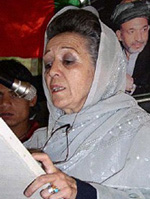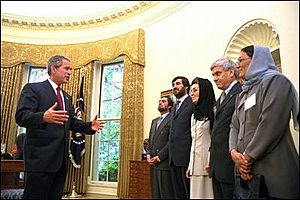Suhaila Siddiq facts for kids
Quick facts for kids
Lieutenant General
Suhaila Siddiq
|
|
|---|---|
 |
|
| Minister of Public Health of Afghanistan | |
| In office December 2001 – 2004 |
|
| President | Hamid Karzai |
| Personal details | |
| Born | 11 March 1949 Kabul, Afghanistan |
| Died | 4 December 2020 (aged 71) |
Suhaila Siddiq (born March 11, 1949 – died December 4, 2020) was an important Afghan politician. Many people called her 'General Suhaila'. She was the Minister of Public Health in Afghanistan from December 2001 to 2004. Before that, she was the top doctor, or Surgeon General, in the Afghan military.
As a government minister, she was given the special title "Honorable". Suhaila Siddiq was one of the few women leaders in Afghanistan. She was also the only woman in Afghanistan's history to reach the high military rank of lieutenant general. General Seddiq worked for the Afghan government for a long time, starting when King Mohammed Zahir Shah was in charge.
Contents
Early Life and Schooling
Suhaila Siddiq was born in Kabul, the capital city of Afghanistan. She was born on March 11, though her exact birth year is sometimes listed as 1938 or 1949. She came from a well-known Pashtun family. Her father was a governor in the city of Kandahar. She was one of six daughters in her family.
After finishing high school, she started her medical studies at Kabul Medical University. She then completed her medical training at Moscow State University. This university was in the Soviet Union, a country that no longer exists today.
A Career in Medicine and Politics
During the government of Mohammad Najibullah (1987–1992), Suhaila Siddiq became a surgeon general. This means she was a very high-ranking doctor in the military. She was also the chief of surgery at the main hospital in Kabul, called Wazir Akbar Khan Hospital. She worked there both before and after the Taliban took control.
When the Taliban ruled, they had very strict rules, especially for women. But Suhaila Siddiq bravely continued to teach medicine to women. She also managed to reopen the women's part of the hospital where she worked, after the Taliban had closed it.

Many Afghan women who fought for equal rights admired Siddiq for her actions during the Taliban era. She and her sister Sidiqa, who was a professor, were among the very few women who refused to wear the burqa, a full-body covering. She famously said, "When the religious police came with their canes to hit me, I raised mine to hit them back. Then they lowered their arms and let me go."
After international forces helped remove the Taliban government, Suhaila Siddiq was chosen as the Minister of Public Health. Interim President Hamid Karzai officially swore her into office. One of her first actions was to ask for help from other countries. She wanted to build up a strong team of women medical workers. She met with a team from the World Health Organization (WHO). She told them that training Afghan women was very important because they are a key part of the health system.
As minister, Suhaila Siddiq led important health programs. In April 2002, she helped organize a program to vaccinate about 6 million Afghan children against polio. This was done with the help of the United Nations Children's Fund. In July 2002, she met with officials from China. They agreed to help pay for the repair and update of a hospital in Afghanistan. This hospital was planned to be the most modern in the country. In November 2006, Siddiq gave a speech in New York City about AIDS in Afghanistan.
Personal Life and Passing
Suhaila Siddiq lived her entire life in Afghanistan. She never got married. She said that she was too dedicated to her job and did not have time for a husband. She once said, "I didn't marry because I didn't want to take orders from a man."
Siddiq was one of five daughters of Mohammad Siddiq. Her father was a governor in the cities of Kandahar and Herat when King Zahir Shah Khan ruled. Her younger sister, Mastura Aziz-Sultan, was also a doctor. She specialized in women's health. Her other sisters live in different parts of the world. Another younger sister, Sediqa, who was an engineer, passed away in 2001.
Suhaila Siddiq had Alzheimer's disease later in her life. She passed away in Kabul on December 4, 2020, at the age of 72. She died from problems related to COVID-19 during the COVID-19 pandemic in Afghanistan.
See also
 In Spanish: Suhaila Seddiqi para niños
In Spanish: Suhaila Seddiqi para niños
 | Bessie Coleman |
 | Spann Watson |
 | Jill E. Brown |
 | Sherman W. White |

